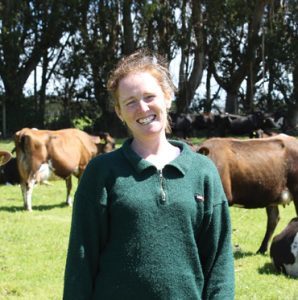Asking the right question
If we all remember to ask the right questions, we should hopefully, always get the answers we need, Southland dairy farmer Suzanne Hanning says.

 WE HAVE BEEN IN THE fortunate position these last few years to have had cows selected to be contract mated with our AI company. This year, one of the girls destined for greatness missed the bus. Cow 488 with her BW of 414 and PW of 696 was scanned not in calf. I was gutted.
WE HAVE BEEN IN THE fortunate position these last few years to have had cows selected to be contract mated with our AI company. This year, one of the girls destined for greatness missed the bus. Cow 488 with her BW of 414 and PW of 696 was scanned not in calf. I was gutted.
Our policy is that we do not keep carry over cows. One could say, “but she is exceptional!” My reply would be: would you want a bull out of a carry over cow being used in your herd? I wouldn’t.
Quite often, we hear farmers saying they want answers. The answers we think of in recent decades have been more milk, more protein, more fat.
Artificial insemination is the norm these days. Elite cows being contract-mated by breeding companies to produce offspring with superior genetics has evolved into using embryo transfer in those cows to maximize the number of progeny. If you could have one elite offspring, why not try for more?
To individual farmers this is a potential gold mine.
There are a few questions I believe we have forgotten.
What does our customer want? Does our customer want to buy food from farms that have used hormones to ensure offspring or multiple offspring from individual cows? Is this how they envisage where and how their food is produced?
There is no point being defensive about this as they have the choice to buy from any number of other countries or even milk alternatives. If they don’t like the story, they won’t buy the product.
We can’t trick our customer either by saying “There’s no hormones in milk”. Technically, this statement is true, but it is not honest.
If we claim we do not use hormones in the production of our cows’ milk, we’d better make damn sure we don’t. But if we do, then we need to clearly communicate why. We need to trust our customers that they will understand when given the full story.
Also, what effect are the hormones used for flushing these embryos having on the fertility of the national herd? Does their broad use create cows that become reliant on them to get in calf due to the sires created? Are we putting individual farm profits before the welfare of the industry? Elite stock are worth serious money, but if it comes at the cost of the fertility of the national herd, I’m not sure it is worth it.
I am not saying hormones are bad. We simply need to think carefully about their consequences. We also need to remember to bring the people who buy our food with us on whatever journey we choose to go on.
Thankfully, 488 is headed to another farm where she will hopefully get in calf next season. We have asked her new ‘employers’ not to use her for anything other than producing milk. This may sound a bit hypercritical of us, but just because our policy is not to hold over cows doesn’t mean this cow shouldn’t achieve her potential. I will not judge other farmers for their policies as everyone has different reasons for their choices.
If we all remember to ask the right questions, we should hopefully, always get the answers we need.





